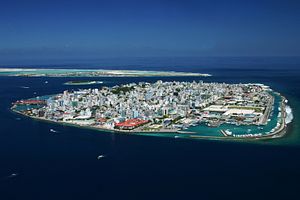The world’s eyes have been on the United Nations in the penultimate week of September, but don’t let the antics in New York overshadow a momentous election result in a small country in the northern Indian Ocean.
On September 23, voters in the Maldives delivered an astounding mandate to Ibrahim “Ibu” Mohamed Solih, the candidate of a joint opposition coalition. Solih was facing tall odds, making his victory all the more surprising.
He was going up against Abdulla Yameen, who had taken the small atoll country in a decidedly autocratic direction. Yameen had cracked down on the country’s former and first democratically elected president, Mohamed Nasheed, who had been imprisoned after a sham trial in 2015, and went on to target the country’s first president, Maumoon Abdul Gayoom, his own half-brother, earlier this year.
All this accompanied a general restriction on freedoms in the country and even a declaration of a state of emergency earlier this year. Yameen’s iron-fisted turn took the country away from its historic partner, India, and drew it towards China.
The country enthusiastically signed up to Chinese President Xi Jinping’s “Belt and Road Initiative”, took out major loans to finance infrastructure projects and entered a free-trade agreement with China in the final weeks of 2017 without proper legislative deliberations.
Under Yameen, the Maldives quickly came to be regarded as just another chess piece in the growing geopolitical tug of war between India and China in the Indian Ocean. Placing the September 23 election result in that same light would do a disservice, however, to the real story, which is the remarkable resilience of Maldivian democracy.
Consider that a whopping 90 per cent of eligible voters turned out to make their voices heard, giving Solih 58 per cent of the vote – a number that Yameen could not ignore. After the preliminary results emerged, there followed an uncomfortable 24 hours or so of silence from Yameen’s camp, suggesting that he might seek to bring down the Maldivian state’s institutions on the outcome, shattering all pretence of democratic process.
But in the end, Yameen did concede. Interestingly, in unusual practice, both New Delhi and Washington put out statements congratulating Solih based solely on preliminary counts by independent observers and non-governmental organizations. This may have given the result early legitimacy and ballast too.
On the geopolitical front, many have commented on the similarity between the outcome of the Maldives’ 2018 election and the January 2015 election result in Sri Lanka, which saw pro-China strongman Mahinda Rajapaksa ousted in favour of the more even-minded Maithripala Sirisena.
That comparison only goes so far. For the new Maldivian government, China will continue to be a partner – just not at the expense of India. The Maldives will look to right its image on the world stage, but that won’t mean pushing China away.
The China Communications Construction Company, a state-owned enterprise, will remain involved in major projects, including the landmark Sinamalé bridge to connect the overcrowded capital island of Malé with the nearby island of Hulhule, which hosts the country’s international airport.
Solih is unlikely to immediately make like Sirisena – or Mahathir Mohamad in Malaysia – and review his predecessor’s engagement with China. But, for states like India and the United States, the more important result will be a slowing of the pace of rapprochement between Malé and Beijing.
For New Delhi, scenarios that might have once seemed far-fetched, like a Chinese naval facility on a Maldivian island, are less likely to come to pass. India can’t take credit for the Maldivian people’s vote for Solih, but it can take this as an opportunity to restore its historically close links with the Maldives.
For Beijing, meanwhile, even if Solih doesn’t hit the ground running with a review of China-backed projects, there will be a growing sense of unease at how the belt and road plan can face shocks as a result of the internal politics of participating countries. The Maldives is the latest case in a growing list of examples – and likely not the last.
This article first appeared in the South China Morning Post. It is republished here with kind permission.

































